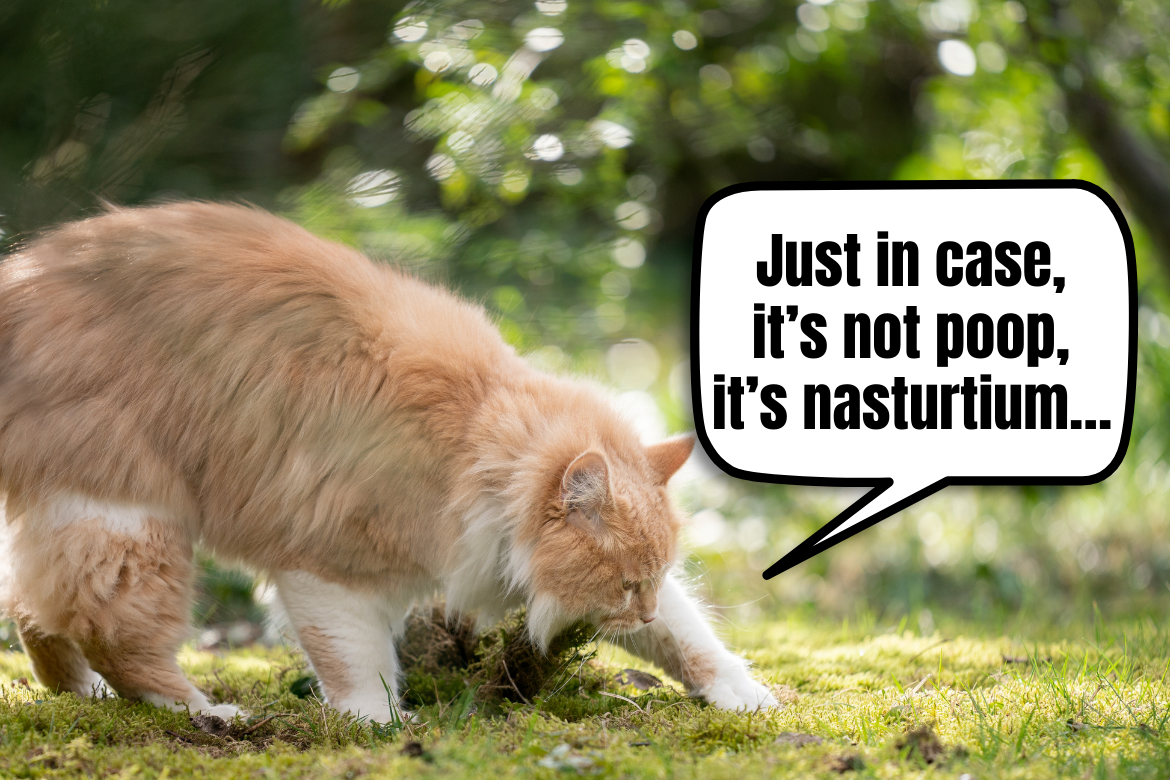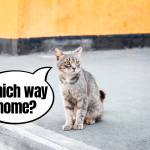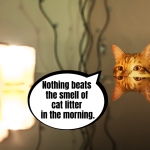If you ever repotted your house plants in a cat’s company or came into a room in the morning to see a plant pot lying on the ground with the soil spilled everywhere, today’s topic will not be much of a secret to you, fabCat! Among many strange hobbies, cats can have, gardening or, in a more advanced scenario – mining definitely deserves to be on the podium. But where does it come from, why are some cats so into getting their paws dirty and what should you look out for if your cat does like to roll around in the dirt? Let’s find out.
All about cats’ love for gardening and mining. Why do cats like digging around in the ground?
Being interested in the ground, be it digging in it or rolling around can be linked to a few of the cat’s basic needs: searching for safety (and marking their own territory), hygiene, thermoregulation, and good fun. Depending on the space and circumstances in which a cat decides to get close to nature, we can quite easily recognize what needs are they trying to fulfill and, if necessary, we’ll be able to provide them with a better alternative. But let’s start from the beginning.
Cats dig and roll around in the ground to:
- mark their territory
Scents play an important role in a cat’s life – they let them mark their own territory and say directly: “I was here”. It’s key for a cat’s sense of security regardless if they are strictly an indoor cat or if they have access to the outside world. In the case of indoor/outdoor cats (including those who have a secured catio or go out on walks on a leash), the territory they will try to mark as their own grows bigger. It’s no surprise that they are always on the lookout for something that’s good at transferring scents. Soil makes for a great scent soaker.
Cats can roll around in the ground to leave their scent mark there, but also to mask the scents of other cats that could be visiting that space.
- to have fun
No cat will miss a chance for having fun and rolling around in the dirt is equally as fun as getting high on catnip! Why fresh soil might you ask? It’s probably about the smells, again – both those left there by other animals and from other organic matter. In the case of the soil that we put into house plant pots, there are often fertilizers put into it to support plant growth – some theories say that it’s the fertilizers that get cats hyped up (though we have to be careful with those as they may turn out to be harmful to cats).
- to cool down the body
Sand baths to cool down? That’s an idea as old as the world and as it turns out, cats love it too! Everyone knows cats love to sunbathe but on the hottest days of the year, even the biggest fans of getting warm will be on the lookout for some shade. Digging out some cool dirt from under the hot surface and lying in it is a real relief. And our domestic cats inherited that technique from their wild ancestors. Good job for being ingenious!
- to get a massage
Do you know that feeling when your back itches and you can’t reach to scratch it? Cats experience it too and rolling around in the dirt is their way of getting relief. Known for their yoga and acrobatic poses, cats know exactly how to move to make a sand bath give them what they need and can’t achieve with their paws or tongue. Also, cats are purring that stretching on the grass, rolling around in the dirt, and rubbing against a tree is purrfect for getting a full body massage.
What to look out for if your cat likes rolling around in the dirt?
It all depends on the type of dirt we’re talking about and what’s your cat’s outlook on all of that. If their passion for gardening ends in sniffing bags with potting soil, digging through the dirt with their paws, and putting their heads into plant pots when we’re repotting our home jungle, the dirt itself is not a danger to our cats’ lives. Problems arise once the cat starts to intentionally knock over plant pots, taking the dirt out of them and eating it, or when we give our cat access to the outside world and let their safety get out of our hands.
If your cat knocks plant pots down or over, the first thing to try is to change them to ones that won’t break when they fall off the counter or a window sill. If you have the option, try to move the plants away from your cat (especially when, besides digging in the dirt, they have a tendency to chew on the leaves). If you’re not using harmful fertilizers, potting soil shouldn’t be dangerous for cats but it’s always wise to be cautious. You can find more about which plants are safe for cats on ASPCA websites. And if you like having fresh herbs in your kitchen, you can read more about them on our blog:
If you like big plants and your cat is kicking the soil out of the pot – you might have a problem here. If the pot is big enough for the cat to sit on it and dig out the soil or poop in it, the only thing you can do is to somehow secure the plant pot and the soil itself. Start with scattering some little stones on top of it or covering the soil with a fine mesh to protect the surface from curious cat paws. A natural cat deterrent that’s often used to protect plants from kitties is citrus fruit – by placing dried-up peel on top of the soil, you might just be able to discourage your cat from gardening in your pots but we also know cats who will ignore such methods and proceed anyway. If you have your own methods of dealing with cats digging around big plant pots, let us know in the comments.
If your cats have access to the garden or go on walks, always remember that it’s an environment you can’t control. A cat rolling around in the grass and dirt that’s been visited by other animals before has a higher risk of catching all sorts of parasites, ticks or bacteria, and viruses spread around by other animals. Cats are very clean and anything that gets on their fur will be quickly licked off it, going straight into the cat’s digestive system. Besides ticks and parasites which we should always protect our cats against, the soil in a garden, around the city, or in a park could also be potentially harmful because of the fertilizers and weed-control products.
Find safer alternatives
Does your cat love to roll around in the dirt? It’s not the end of the world, as long as they don’t knock a plant pot with freshly watered soil down onto your white, fluffy carpet in the living room 🙂 However, if you do want to eliminate this sort of behavior, be it for the cat’s safety or your own convenience, every unwanted behavior could be corrected with a more enticing alternative. You just have to figure out what purpose gardening serves in your cat’s life:
- knocking down pots to kill boredom? Introduce a more frequent playtime schedule into your daily life.
- digging in the soil to do their business? Take your cat to the vet to test their urine and stool and think about changing their litter in the litter box – your cat might be choosing dirt in your plant pots because it’s softer for their paws than whatever’s in the litter box.
- knocking plants off the window sill to chew on them? Make sure all the plants you do have in your home are safe for your cat and give your feline access to fresh grass they can chew whenever they want to.
- lounging in the grass to cool down? Remember to always give your cats access to shade and water bowls – heat waves are quite unbearable for the tiny cat’s body.
- does your cat like to roll around in the dirt just for fun? If it’s a safe potting type of soil or dirt in your private garden, you can let your cat just be themselves! However, if you want to avoid having soil spilled all over your floor, think about spilling some catnip instead or creating a small, at-home sandbox for your feline friend.
Do your cats sometimes knock over plant pots, roll around in the dirt or take sand baths in the freshly cleaned litter box? We’re waiting for your stories in the comments and if you want to share photos of your kitties in action, drop them over in today’s post on our Facebook page → https://www.facebook.com/




